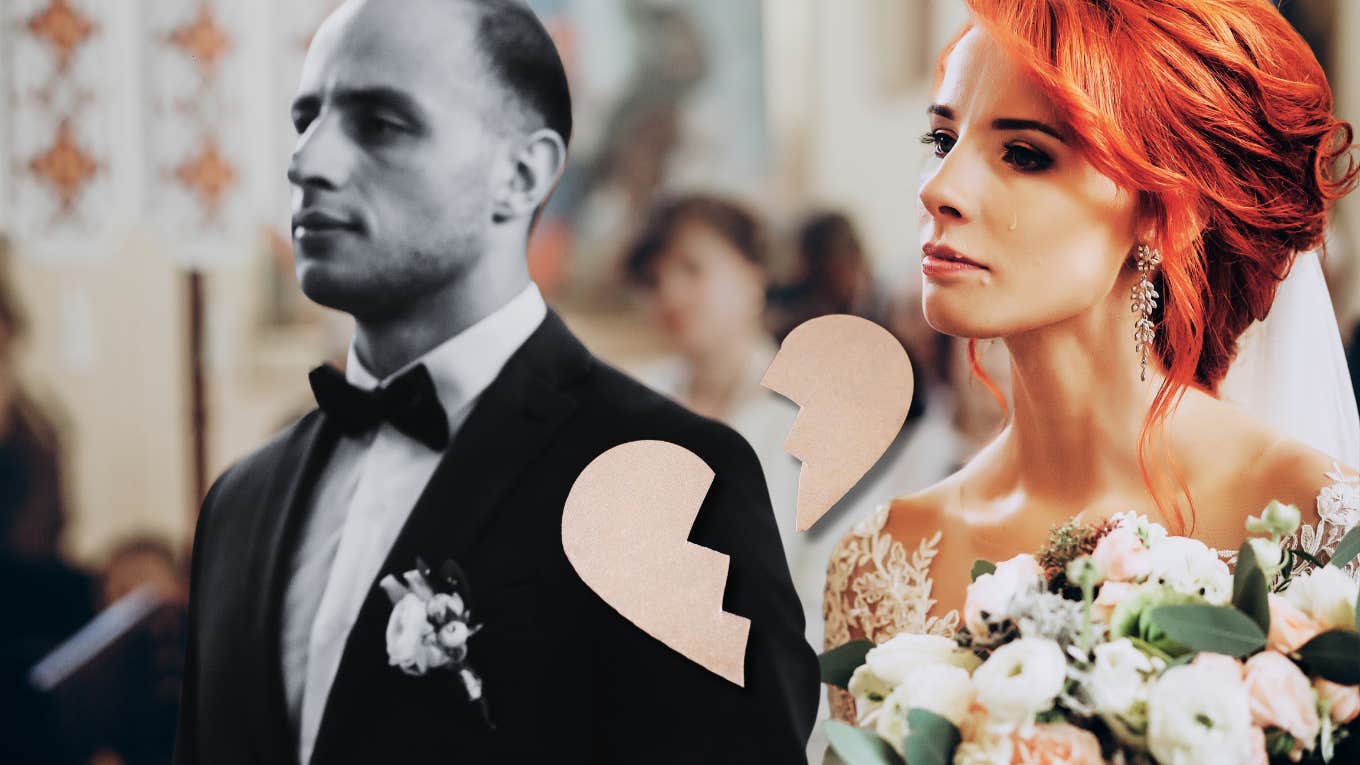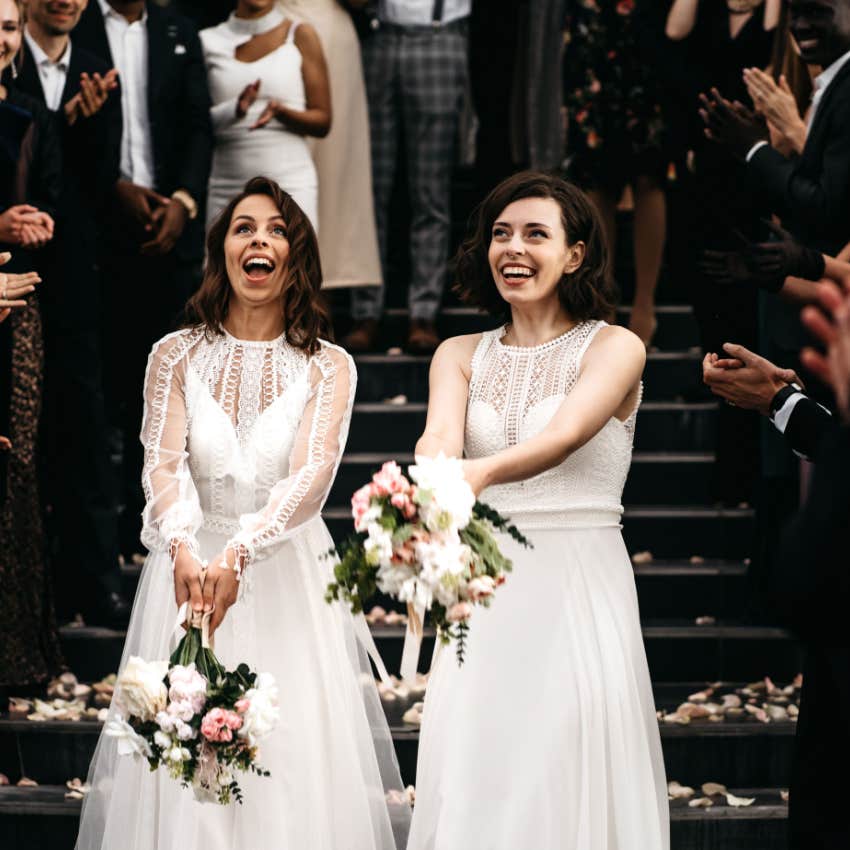The Moment I Knew My Heterosexual Marriage Was Destined To Fail
At the time, I didn’t have the courage to choose a different path.
 Bogdan Sonjachnyj, RDNE Stock project | Canva
Bogdan Sonjachnyj, RDNE Stock project | Canva The tears started as soon as my stepdad and I began our walk down the center aisle of the chapel. My chaste white lace gown felt scratchy and tight around my neck. I wasn’t sure if it was the high collar of my dress or the lump that had formed in my throat that was cutting off my air supply.
Walking down the deep red carpet, I vaguely remember feeling proud that my white gown was a true symbol of my virgin status, a rare accomplishment for a woman of twenty-five. My thoughts were running wild, and my heart was racing as I gripped my stepdad’s arm a little tighter.
Once my tears began, there was no stopping them, and it embarrassed me. I was not the type to cry in front of my friends, let alone the hundred people who’d gathered to watch us tie the knot. As we proceeded down the aisle, I noticed my ex-fiancé, Jack, in the crowd and wondered how I managed to narrowly escape marriage once, only to find myself in a wedding dress, walking toward a future I didn’t want.
The wedding ceremony was meticulously planned and included lots of music, two pastors, and most of my friends. Reciting the vows we’d written for each other was physically painful for me. It was difficult to talk through my tears, and I wondered if everyone could sense I was betraying myself with each word.
My soon-to-be husband vowed to be my “Mr. Romance.” Even as he said the words, I knew there was little hope he would keep his vow. Partway through my promises to him, I was crying so hard that one of the pastors exchanged my tear-soaked tissues for a fresh wad of Kleenex, stuffing the wet ones into the pocket of his suit jacket.
At the end of our emotional service in the University of Puget Sound’s quaint chapel on the edge of campus, we high-fived before walking arm-in-arm down the aisle to the sound of triumphant recessional music. For a moment, I was relieved it was over.
But as we walked through the chapel doors into the foyer, the words, “What the heck have I just done?” reverberated in my head. This is not what one expects to think after their wedding, and I worried that I may have said it out loud.
Not seeing a look of surprise on my newly minted husband’s face, I did my best to drive that thought far from my mind as we signed our marriage certificate and headed to our reception.
Looking back on that day nearly forty years ago, I wonder if I subconsciously knew my marriage would fail. My tears were evidence of the death of my dream to experience the kind of same-sex love I’d fantasized about for more than a decade.
Same-sex marriage wouldn’t be legalized for another thirty years, and I had never met a lesbian or gay couple, so there were no examples of the kind of life I longed for. All I knew was that I desperately wanted to be with a woman but could see no clear path to that happening.
I can’t quite imagine doing things differently than I did. Though I wish I’d had the courage to be the queer woman who was buried deep inside me, I can honestly say that I didn’t know how. I knew I wanted children, and the only logical move seemed to be a traditional marriage.
My relationship with Jack, my first fiancé, was emotionally explosive. Though I’m sure he loved me, I felt controlled by him and found he regularly pushed my boundaries, especially physically. During our brief engagement, I started having regular debilitating migraines, and I finally set myself free, giving back the diamond ring to make sure he knew my decision was final.
The man who would eventually become my husband felt safe. He was nice but detached and unemotional, making me feel free of the expectation to act like a girl in love. He was a good man, and I figured we’d be able to raise a couple of kids together without being emotionally entangled, and as a closeted lesbian, that worked for me.
The secret
Even as a child of ten or eleven, I knew I was different from my friends. I wasn’t longing for Prince Charming to sweep me off my feet, and I felt out of place when my friends talked about the boys they liked. As a teenager, I was stealing my brother’s barely hidden Playboy magazines to gawk at the naked women on the glossy pages.
In college, my attraction to girls continued, but in the late ’70s, being ‘out’ wasn’t accepted, so I kept my feelings to myself. During my senior year of college, I got involved with one of the many Christian groups on campus and happily devoted my life to God. At some point, I consciously decided to marry a good Christian man.
And that’s how I found myself wearing a lacy white gown inside a quaint Chapel on a sunny June day in 1984.
Christianity acted as a buffer for my same-sex leanings. Our campus fellowship prized purity before marriage, which was a welcome value for a girl like me to uphold. I remember telling my future husband that I wouldn’t even kiss a man until I was engaged, let alone have sex before my wedding night. When I look back on my marriage, it’s easy to understand the lack of emotion and connection between us.
Even our engagement was more of a business arrangement. We were both facing life changes: he was graduating from college, and I was planning on becoming a missionary. We decided that because he, too, was interested in missions, it made logical sense to head that direction together.
There was no proposal, no romantic bended knee moment. We made a decision to get married, shopped for a ring, set a date, planned the wedding, and left for a short-term mission trip a couple of weeks after our honeymoon.
I worked to be a content, good wife for years. We struggled to connect on a deep level, both of us products of our dysfunctional backgrounds. We were deeply involved in our church and, from the outside, looked like we had our crap together. But in reality, we were like two parallel lines that couldn’t seem to bend toward each other.
The agony
Later in our marriage, after three children and a cross-country move to the Pacific Northwest, things went from neutral to strained. I struggled with severe chronic pain and frequent migraines. Many days, I could do little more than rest on the couch.
With the help of a few surgeries and a rigorous treatment protocol, I was able to gain strength and mobility. But as I got better physically, my marriage disintegrated emotionally. My husband was distant and cold, and no encouragement from me made a difference.
We attempted marriage counseling, and the results were disastrous. The therapist gave us assignments each week, and my husband refused to do his part. When I got discouraged, he looked me in the eye and told me he would never be the husband I wanted him to be and that I needed to ‘get over it.’
Initially, I played the role of a martyr, often saying I’d choose to be miserable for the sake of my children having a stable home. Then, I emotionally tanked. I began unexplainably losing weight to the point that my ribs were visible under my skin. Depression and despair enveloped me like a winter coat in a blizzard.
For months, I was in a dark place, and eventually, I considered taking my life. The second time I found myself on the floor of my walk-in closet, clutching a bottle of sleeping pills, I knew something needed to change.
In a moment of clarity, I saw that I had the power to free myself from my marriage. Realizing that I held the pen that would write the rest of my life’s story was enlightening. And then, something remarkable happened that dramatically changed my life. I started working for a group of physical therapy clinics, and in the process, I met a woman who enchanted me.
She was the woman of my dreams.
The Ecstasy
When I met my future wife, I was inexplicably drawn to her in a way I’d never previously known. Having hidden my sexuality for four decades, I wasn’t prepared for the emotional high that I experienced.
 Supamotionstock.com / Shutterstock
Supamotionstock.com / Shutterstock
It was, all at once, liberating and intoxicating. For the first time, I allowed myself to envision what a happy life might look like. I wanted nothing more than to dive into the warm water of same-sex attraction that I felt for her. I didn’t want to dip my toe in that pool; I wanted to be immersed.
We’ve been together for about fifteen years, and unequivocally, they’ve been the best years of my life. While it may be hard to believe, being with my wife has exceeded every fantasy I’ve had. The reality of our love has been the greatest joy of my life.
Looking back, I’m saddened that I spent twenty-five years in a mostly lackluster marriage, and I’m sure my former husband has his regrets. But I wouldn’t trade it even if given the chance because I have had the privilege of raising three wonderful children created within our ill-fated union.
Our lives consist of a series of decisions and experiences, some of which we choose and others that are forced upon us. While I don’t believe we are the sum of our choices, I’m grateful for the woman I’ve become due to those experiences.
Kim Kelly Stamp (she/her) is a writer and speaker who writes about authenticity, retirement, relationships, and life on the road.

